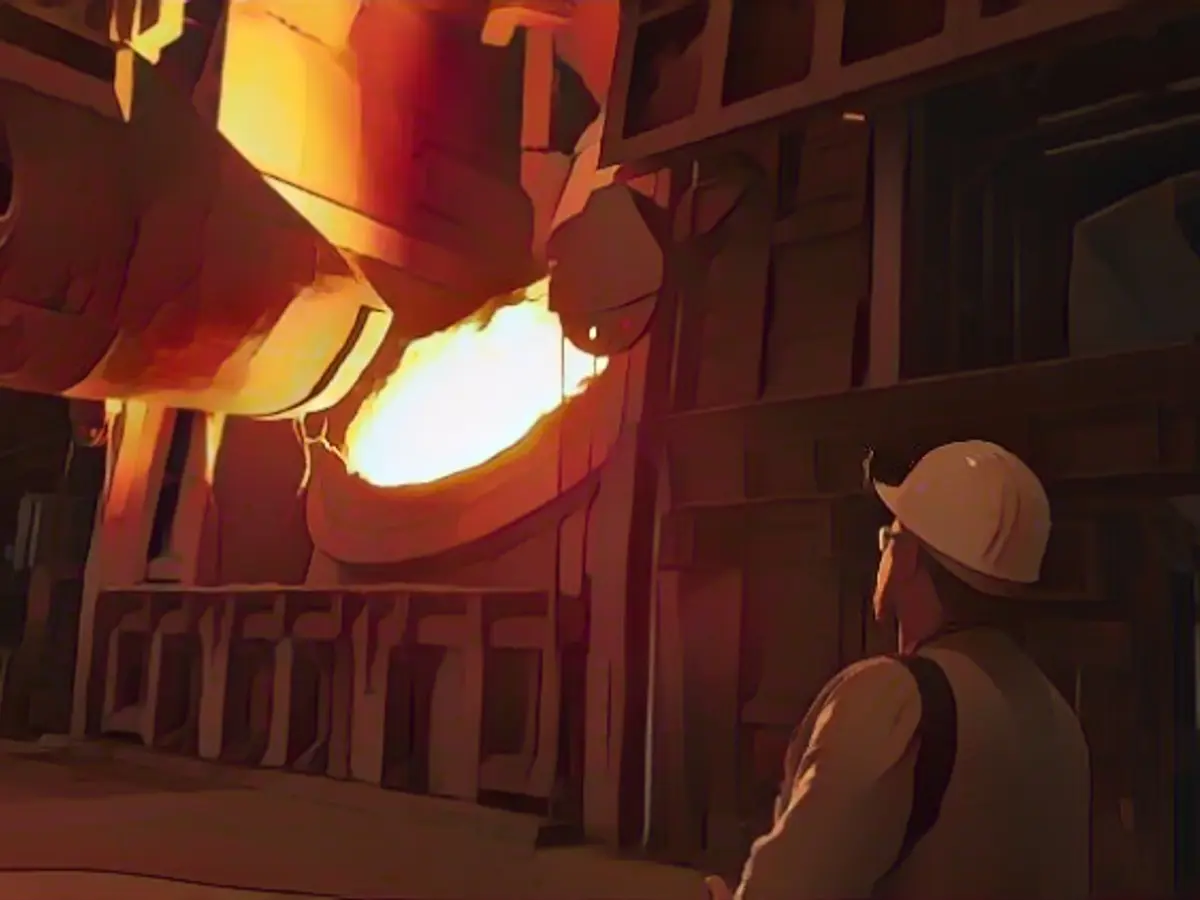Steel industry agrees to reduce working hours
After marathon negotiations, the bargaining parties agree on a new regulation of working hours for the north-west German steel industry. Although the reduction to a 32-hour week does not apply with full wage compensation, this is a pilot agreement for other collective bargaining districts.
For the first time, working time regulations have been agreed in the German steel industry for the upcoming transition towards climate neutrality. The rules are part of a collective bargaining agreement between IG Metall and the steel employers' association for the north-west German steel industry, which was agreed by the parties in Düsseldorf. In addition to a 3,000 euro inflation compensation bonus and a wage increase of 5.5 percent from 2025, the collective agreement also includes a collective agreement on job security.
This is to be applied if fewer workers are needed as a result of the planned transformation. This applies, for example, to coking plants whose coke will one day no longer be needed in hydrogen-powered steel production plants.
The agreement was reached in the 5th round of negotiations after around 14 hours of marathon negotiations in Düsseldorf. It is regarded as a pilot agreement for the other collective bargaining districts in the steel industry.
32-hour week possible without full wage compensation
On the one hand, the agreement provides for regulations for companies or parts of companies in which "pressure on employment" arises as a result of the transformation. In this case, working hours can be reduced by three hours to 32 hours, based on the standard working time of 35 hours applicable in the industry. IG Metall was unable to push through its demand for full wage compensation, but was able to achieve payment of 33 hours. The collective agreement also provides for regulations in the event of additional requirements, for example due to the temporary parallel operation of old and new technologies. Working hours can then be increased by up to three hours. The existing regulation on overtime pay will then apply.
The agreement also provides for the possibility of reducing individual working hours from 35 to 33.6 hours in all companies, but without wage compensation and only if there are no operational reasons to the contrary. Only those aged 60 and over who work shifts are to be paid 34.1 hours from 2025. This age limit is to be lowered by one year in each of the following two years. The collective bargaining parties then want to evaluate the regulation in 2027.
IG Metall chief negotiator Knut Giesler expressed his satisfaction with the result. One of the most important goals had been achieved. "We are giving employees security during the transformation. If there is pressure on employment, the reduction in working hours with partial pay compensation means that the remaining work can be spread across several shoulders." A start has been made with the individual desire to reduce working hours.
The employers rated the regulations as "very positive". Reiner Blaschek, Chairman of the German Steel Employers' Association, emphasized that, together with IG Metall, it had been possible to create a tailor-made regulation on working hours and job security during the ecological transformation. The regulation on individual working hours gives employees more flexibility. "It was important to us that, as a rule, no compensation is paid for this."
Compensation bonus is paid on a staggered basis
The compensatory bonus will be paid in stages: 1500 euros will be paid in January, followed by 150 euros in each of the months February to November. Trainees will receive a total of 1800 euros, also staggered. Following the increase in salaries from January 2025, the collective wage agreement will run until September 30, 2025. The union had originally entered the negotiations with a demand for a wage increase of 8.5 percent over a period of twelve months.
However, the employers expressed their skepticism: "The agreed pay increase is stretching the companies' capabilities to the limit in view of the rapidly deteriorating conditions for the German steel industry," said Blaschek. Giesler, who is also district manager of IG Metall North Rhine-Westphalia, on the other hand, spoke of a "sustainable increase in income".
Warning strikes with tens of thousands of employees
The peace obligation ended at the end of November. Since then, several tens of thousands of steelworkers have taken part in warning strikes lasting several hours. In recent days, the union had called for 24-hour warning strikes, including in Duisburg, the largest steel location in Europe.
Around 68,000 people are employed in the steel and iron industry in North Rhine-Westphalia, Bremen and Lower Saxony. In the eastern German steel industry, with around 8,000 employees, the 5th round of negotiations is scheduled for December 18. In the Saarland steel industry, with around 15,000 employees, collective bargaining has not yet begun. There, the peace obligation ends at the end of February. In addition to Saarland, the collective bargaining area also includes two plants in Wetzlar (Hesse) and Kehl (Baden-Württemberg).
Read also:
- Why there is still no EU funding for green Saar steel
- 3 billion Saar Fund is unconstitutional
- The chemical industry has little confidence
- Politicians at a loss after shock news
The collective bargaining agreement between IG Metall and the employers' association in the steel industry also covers the reduction of individual working hours from 35 to 33.6 hours without wage compensation, providing more flexibility for employees.
The steel employers' association, represented by Reiner Blaschek, praised the regulation on individual working hours, stating that it was important that no compensation was paid for this increase in flexibility.
Source: www.ntv.de








